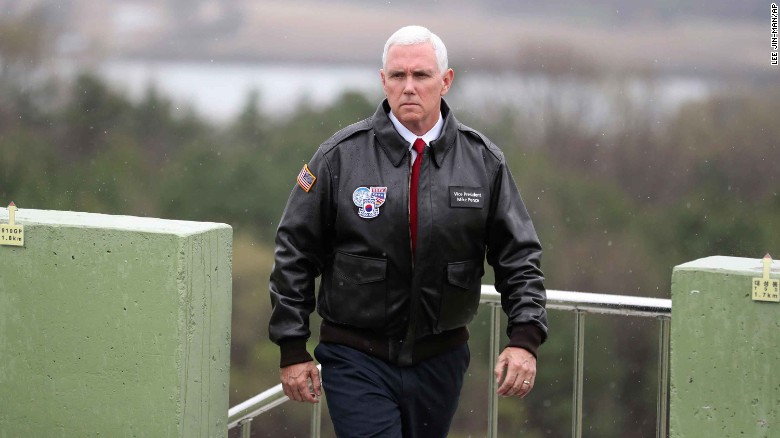Vice President Mike Pence offered a new round of warnings to North Korea on Monday – this time directly from the Korean Demilitarized Zone dividing South Korea from its aggressive northern neighbor. In his remarks, Pence made it clear that President Trump will not employ a continuation of international norms established by his predecessor.
“We’re going to abandon the failed policy of strategic patience. But we’re going to redouble our efforts to bring diplomatic and economic pressure to bear on North Korea. Our hope is that we can resolve this issue peaceably,” Pence said after his speech at the DMZ.
North Korea has graduated from nuisance to legitimate threat in recent years as their fledgling nuclear and ballistic missile programs have grown in promise and capability. In their recent military parade celebrating the birth of North Korean founding father, Kim Il Sung, North Korea had a wide array of nuclear capable missiles on display. Included among them were two launch canisters the North Korean government is happy to have us all assume contained fully functional intercontinental ballistic missiles – but likely were actually just demonstrations of their intended final product.
“We will defeat any attack and we will meet any use of conventional or nuclear weapons with an overwhelming and effective response,” Pence said before adding that, when it came to North Korea, “all options are on the table.”
The White House’s new strategy in dealing with North Korea has been emboldened by two recent developments: the first is the shift in perceptions of Trump’s administration in the minds of the international community after launching a guided missile strike on a Syrian Air Force base believed to be responsible for a chemical weapons attack on civilians earlier that week. This decision placed a great deal of stress on relations between the United States and Russia, as well as sending ripples throughout domestic politics. Following that strike, the U.S. military dropped the largest non-nuclear weapon in its arsenal on a subterranean ISIS stronghold in Afghanistan – further solidifying Trump’s reputation as a man who won’t pull any punches when pursuing or defending American interests.
“Just in the past two weeks, the world witnessed the strength and resolve of our new president in actions taken in Syria and Afghanistan,” Pence said during his speech. “North Korea would do well not to test his resolve or the strength of the armed forces of the United States in this region,” Pence said.
The second recent development being incorporated into the White House’s North Korean strategy is a new level of cooperation between the U.S. and its economic and political rival, China. As North Korea’s primary and most powerful ally, China accounts for nearly ninety percent of North Korea’s export market – meaning sanctions levied by the Chinese government could cripple the North Korean economy if they chose to do so. Recently, China denied some shipments of coal arriving from the reclusive nuclear state – sending them back to North Korean ports and almost certainly delivering an unwelcome message to the Kim regime.
“I know the President was heartened by his discussions with President Xi (Jinping). We’ve seen China begin to take some actions to bring pressure on North Korea but there needs to be more,” Pence said.
China, which maintains a three-pronged policy on North Korea aimed at keeping the nation from falling into war, giving way to internal instability, or attaining nuclear weapons, has made a number of statements calling on the United States and North Korea to find a peaceful resolution to their nuclear dispute – a dispute that receives regular doses of North Korean threats of preemptive nuclear strikes. In a subtle shift in directive, China has now publicly accepted that they too have a level of responsibility to seeking a peaceful resolution to North Korea’s provocations.
“Resolving this issue requires all relevant parties, especially parties that bear major responsibility and play a key role in this issue, to work in the same direction and make a joint effort,” Chinese foreign ministry spokesman Lu Kang said in a daily press briefing on Monday.
The American carrier strike group led by the USS Carl Vinson is already en route to North Korea’s coast, with Japanese Maritime Defense Force destroyers following suit. The display of naval might is intended to serve as a deterrent hoping to stifle North Korean aggression, but may well serve as the launching platform for offensive operations intended to disarm Kim of his growing nuclear arsenal.
Already have an account? Sign In
Two ways to continue to read this article.
Subscribe
$1.99
every 4 weeks
- Unlimited access to all articles
- Support independent journalism
- Ad-free reading experience
Subscribe Now
Recurring Monthly. Cancel Anytime.











COMMENTS